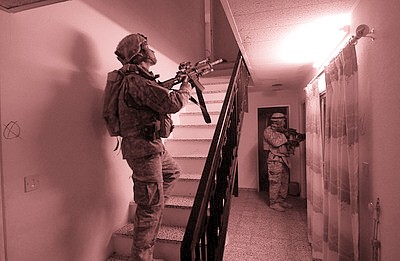Daily Life: Military continues to violate the rights of civilians

BAGHDAD, 9 October (IRIN) - Raid Othman al-Dulaimi, a 36-year-old engineer, still vividly recalls his suffering on a night last winter when his five-month ordeal with the Iraqi army began. The army raided his house in Baghdad in late December 2005 following a roadside bomb attack nearby.
"They accused me of having links to the attackers. They put all of us in the garden and beat me in front of my wife and children. They overturned all the furniture and stole my private computer, money and gold," al-Dulaimi said, adding that he was taken to prison and beaten to elicit a confession.
"After five months of insults and bad treatment they said, 'We are sorry, you have nothing to do with the terrorists,'" he said.
Human rights groups say the rights of citizens, especially those who live in restive areas, are often violated by Iraq's national army and US-led coalition forces searching for terrorists and criminals. They say this has undermined support for the government as a whole.
Iraq's Prime Minister Nouri al-Maliki introduced a 24-point national reconciliation plan in June, which aims, among other things, to curb violations committed during military operations.
"We will not tolerate anyone who violates human rights, as respecting these rights is the most important point in the reconciliation plan to bring stability to this country," Salam al-Zubaie, Iraq's Deputy Prime Minister, said.
While the government's plan does not include US-led coalition forces, "in all our meetings with the representatives of the multinational forces, we stress respecting citizens' human rights and the reduction of all kinds of violations", al-Zubaie said.
As part of the plan, Iraq's Human Rights Ministry has had more army officers taught about international conventions aimed at guarding against abuse during military operations. These officers pass on their knowledge in lectures they give several times a week to others in the Iraqi army and security forces.
"The first thing they have to know is that the defendant is innocent until he is proven guilty," said Farouk Muhssein, a spokesman for the Human Rights Ministry. "And they have to learn how to talk to them [civilians] as they do their duty in a good manner. Beating and insults are not allowed in their work, and they have to pay great attention to the women and children and not scare them."
It is a new way of working for soldiers used to intimidating people. "Violations included scaring people in the streets when army members open fire into the air, or crash into their cars to clear the traffic, or beat people during detention and scare their families," said Major Salman Abdul-Wahid, commander of the Iraqi army's 1st Brigade, and one of the human rights teachers.
Read the rest at Reuters/Alternet

<< Home